A while ago, I had the idea of launching my own website to offer financial advice to women. I’d never built a website in my entire life so was literally starting from zero. I did some research and came up with two companies (out of the gazillions) out there that had some nice-looking templates for me to build my website on. Aside from paying the website-hosting fee, I also had to pick a domain name, which is really the address of my website. That was another fee on top of the web-hosting one. Looking through the list, the usual suspects were front and centre: .com, .net, .org etc. I wanted something zanier and more memorable for my website, like julieannefinance.coach. I found out that for these alternative extensions, I had to pay through the nose for them. Why do I have to do that? And who controls these things?
In this article, we’re exploring something most of us don’t really think about called domain names, how it works currently, how it could work when it’s on the blockchain and how it affects you in a more personal way.
All Hail DNS
We know that a website like cbtest2chanaka.kinsta.cloud is known as a domain name. The .com is a domain extension. In the early days of the Internet, instead of a name, it was a string of numbers known as an IP address, which looks like this: 69.63.176.13. also known as facebook.com. Which one would you find easier to remember? The name or the numbers?
The domain name system (DNS) matches a site’s fiddly numerical IP address with an easily-remembered word or phrase. We can thus leave the boundless joys of IP addresses to the geeks and hackers while the rest of us get on with our lives.
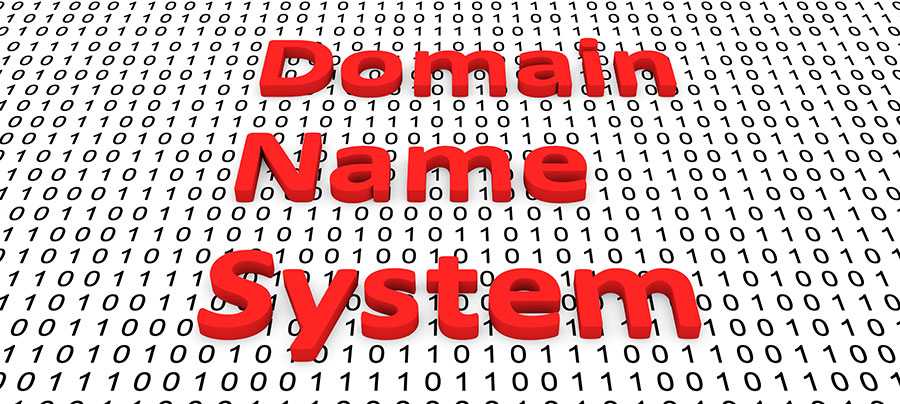
In the early days of the internet there was money to be made from the DNS. Those people in possession of a working crystal ball were able to buy up domain names and sell them on, often for huge profits. In 2019, for example, block.one paid $30 million for voice.com.
Whoever first registered that domain can consider themselves to have had a decent day at the office. A shadier version of this practice known as cybersquatting inevitably sprang up too. This involves registering a trademark as a domain and then selling the domain back to the said trademark’s owner for an inflated fee.
This often leads to litigation and has kept plenty of lawyers busy over the years. One particularly entertaining example involved Microsoft going head-to-head with a Canadian high school student, while other disputes have involved big names like Lufthansa and the rock band Jethro Tull.
ICANN
Back to my earlier questions of: who controls/decides how the domain names work? The answer is an organisation that most people have probably never heard of, the catchily-titled Internet Corporation for Assigned Names and Numbers or ICANN.
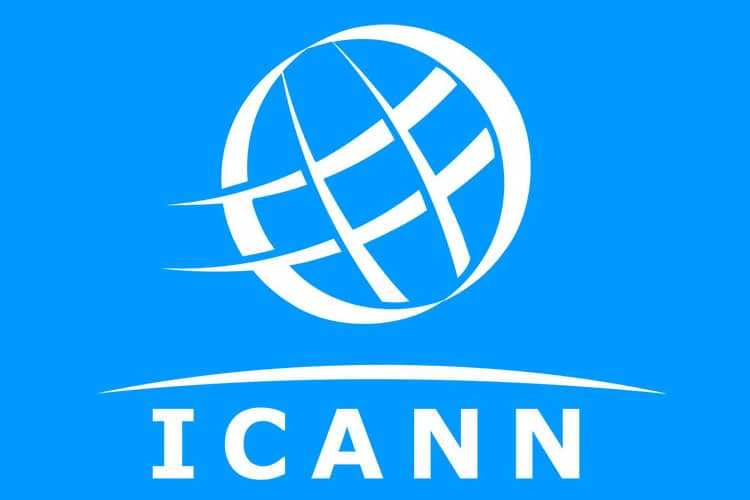
This is a non-profit body, based in California, that regulates and administers the entire DNS. It also authorises other organisations to act as domain name registrars that then themselves manage domain names. Domain.com, GoDaddy and Namecheap are three of the best-known examples of such registrars.
The ICANN is one of those entities that generally chugs along in the background unheeded by most of the world, playing a pivotal, if unsung role in day-to-day life. However, the existence of the ICANN throws up one of the dirtiest words in modern internet parlance: centralisation.
ICANN’T
Anyone familiar with the concept of blockchain knows that one of its key features is its decentralised structure. There is no single point of entry, no back door left ajar. Blockchains are safer because of the lack of a central hub that can be targeted by those with malign intentions and because no one person or organisation is able to assume complete control.
To the many who hold the concept of net neutrality dear, the ICANN represents a centralised soft underbelly that concentrates power and influence in one obvious place. Anyone looking to disrupt, attack or manipulate the DNS knows exactly where to start.
Some will disagree with me, but I find it rather worrying that an organisation of such importance is situated in the United States, within easy reach of characters like Mark Zuckerberg or that fluorescent goon who apparently runs the place.
Better perhaps then if it was situated in China, but then in the current climate that’s a moot point. The registrars that the ICANN oversees are themselves also prime starting points for anyone trying to manipulate or attack the system.
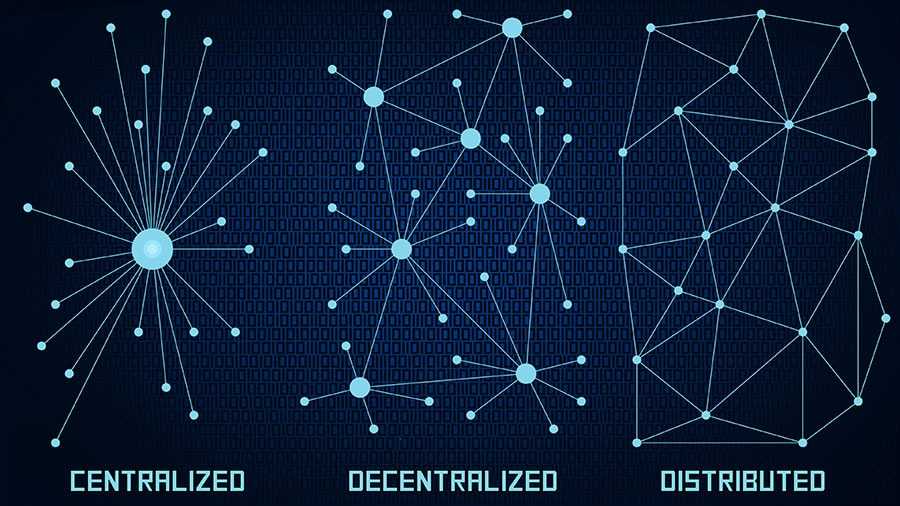
Running alongside the issue of centralisation is the fact that DNS servers are vulnerable to outside manipulation. Websites hosted by these servers can be attacked and disabled either by hackers or national governments for their own nefarious ends.
The owners of these websites live with the constant worry that they could be the victims of extortion or censorship, made possible by the immanent weaknesses of the DNS model.
Hackers especially are well-versed in manipulating the DNS and are often able to exploit its other vulnerability: the fact that the only information servers can see about a client is their IP address. Any hacker worth their salt is able to bounce their IP signal around the world and render themselves undetectable.
So, although the DNS is a vital component of our online lives, it is vulnerable to disruptive forces. In the past, such weaknesses could be written off as a price worth paying for the convenience and speed that the DNS offers. As TinyDNS.org puts it, without it ‘the internet would not exist.’ However, the emergence of blockchain is calling such assumptions into question.
Domain 2.0
What is the alternative to a centralised version of DNS that is susceptible to censorship and hacking vulnerabilities? Enter blockchain domains!
What Is It
We found out earlier that a DNS replaces IP addresses with names. In this case, what gets replaced by blockchain domains are crypto wallet addresses (eg: bc1qxy2kgdygjrsqtzq2n0yrf2493p83kkfjhx0wlh.) This means the domain name is tied to a particular wallet address but it’s stored on the blockchain. The keys to access the website are stored in a wallet in a NFT.
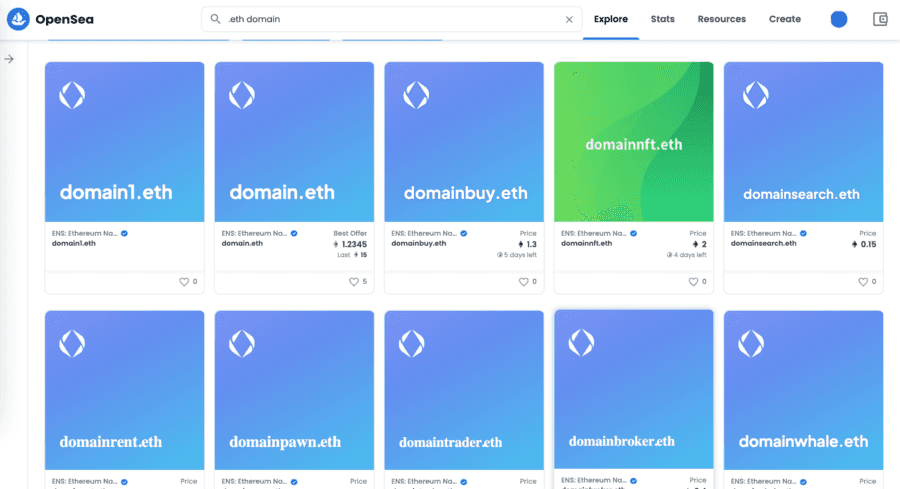
An immediate use-case for blockchain domains is using it to send and receive payments (crypto for now) from anyone. If a website owner needs to be paid for goods or services, then they can simply give the customer their blockchain domain (for example payment.crypto) instead of copying and pasting a clunky wallet address.
The domain can take receipt of a crypto payment and the transaction is preserved immutably on the blockchain. At the moment blockchain domains need plugins to work inside most browsers, but web3.0 platforms like Opera, Metamask and Brave have been developed to support them.
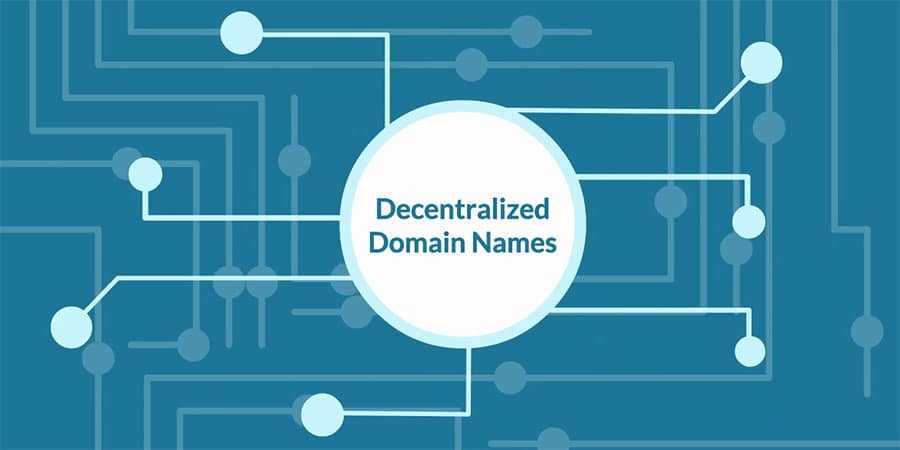
Already both the owner of the blockchain-based site and their customer have had their lives made easier. But things get better still thanks to the fact that the site’s owner also enjoys a greater degree of control and autonomy over their domain and the content on it.
By being part of a decentralised network, blockchain domains are impossible to block and resistant to censorship. The benefits of this are clear to anyone who either lives in an authoritarian state or has spent more than ten seconds considering what that might be like. Freedom of speech becomes much harder to curtail. On the other hand, hate speeches and content promoting disinformation and tribalism will also enjoy the same kind of protection, just saying.
Control rests in the hands of website owners and content creators because the blockchain domains they use are stored in wallets to which only they have the keys. The old system, whereby domain names are stored and managed by registrars who can be induced to shut them down, is starting to look obsolete.
Finally of course, there is the question of security. Blockchains are not entirely immune to hackers and you can be pretty damn sure they’re working on ways to crack them, but they are a heck of a lot more secure than other networks. A website with a blockchain domain is a daunting prospect for hackers and malware.
DNS Software Services
Just as companies like GoDaddy that provide a service to users for buying and registering regular domain names, there are also a number of companies offering similar services for the blockchain domains. It’s important to note that this area is still in its early stages, hence each of the name service primarily focus on one or two blockchains. As the space develops and expands, with more user adoption driving it, there will be more interoperability between blockchains. Listed below are notable key examples.
Namecoin for Bitcoin (x.bit)
One of the earliest name service projects is Namecoin, created shortly after the emergence of the Bitcoin blockchain. It is said that miners mining Bitcoin also provide mining power for Namecoin, known as merged mining. There are two components to Namecoin: NameID and Dot-Bit DNS.
NameID combines a name with OpenID, an authentication protocol. Think of it as the blockchain version of “Login with Facebook” and less invasive. Dot-Bit DNS is basically a decentralised version of the Internet phone book, aka websites. While it’s easy for central authority to go to ICANN and ask them to shut down websites, it would not be possible here.
Ethereum Name Service (ENS - x.eth)
If you’re wondering which blockchains are leading the way in supporting domains then you won’t be surprised to learn that Ethereum features high on the list. The Ethereum Name Service (ENS) is an open-source, not-for-profit endeavour that, in the words of Director of Operations Brantly Millegan, focuses on ‘decentralisation, censorship-resistance and programmability.’ ENS allows decentralised websites to bypass the approval of DNS registrars and the ICANN to build their services directly on top of the ENS blockchain and register a .eth address. Millegan is also at pains to point out that such sites don’t even need the approval of ENS themselves to get going.
When generating a ‘name.eth’ address, a ERC-721 NFT token is minted. The key difference between them and the other services highlighted below is that they’re not looking to substitute the current DNS system. There is also a yearly fee associated with the domain name that can be renewed with ETH.
There is some renewed interest in the project after the recent airdrop of $ENS tokens to those who registered their domain name before October 31st 2021. Like most of the blockchain projects, ENS is moving to a DAO-like structure whereby holders of the token get a voice on the direction of the project. Since getting listed on Binance, the token price has yo-yo’ed quite a bit, between USD40 - USD120 in the space of a week.
Disclaimer: I own some ENS tokens.
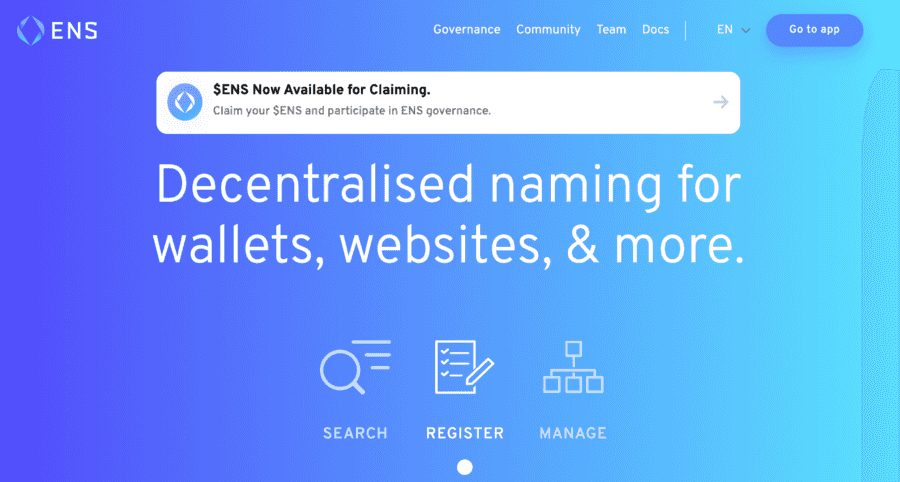
Unstoppable Domains (x.zil; x.crypto)
Another big player in the sphere is Unstoppable Domains. (It started off as a recipient of the ZILHive Grant granted by the entity running the Ziliqa blockchain. The first blockchain domain extension they created was .zil, followed by .crypto on the Ethereum network, which is more widely-used.
This San Francisco-based outfit cites the ‘tribalism’ of much of the crypto community as a major barrier to mass adoption. Their .crypto registry allows users to send and receive any cryptocurrency they like to any wallet of their choosing. CEO Matthew Gould argues that: sending money to a .crypto domain is a way simpler user experience for the millions of cryptocurrency users that currently have to copy/paste and type in long addresses in order to transact. Registering a cryptocurrency on Unstoppable is a one-time deal. There are no renewal fees, unlike ENS.
A few months ago, Unstoppable utilised Cloudflare’s Distributed Web Resolver to allow .crypto web addresses to be viewed from any web browser anywhere in the world. All users need to do to enable this is to update their DNS settings.
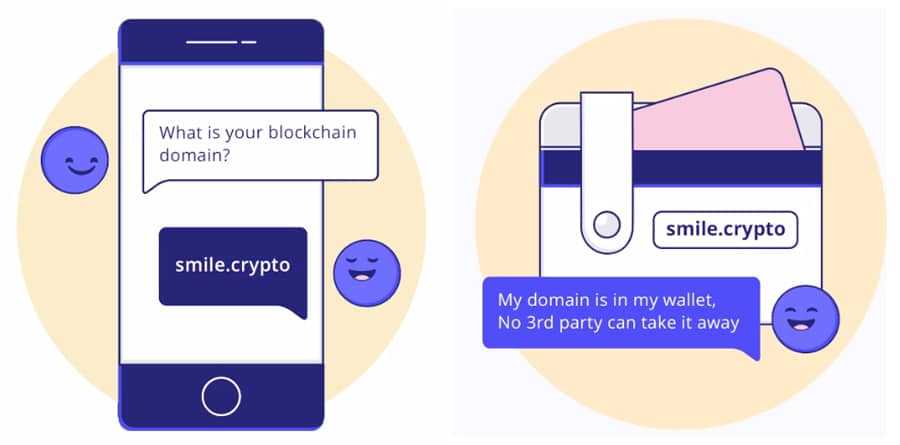
Recently, Unstoppable moved their operations onto the Polygon network. The biggest benefit of this move is that all the gas fees will be taken care of on the Polygon network, thus users don’t need to pay them. The migration will happen in four phases, with the first phase having started on November 15th.
- Phase 1: Minting on Polygon
- Phase 2: Managing domains on Polygon
- Phase 3: Moving minted domains from Ethereum to Polygon
- Phase 4: Moving minted domains from Polygon to Ethereum
It’s exciting to see the progress Unstoppable has made and there are many big things waiting for it down the road.
Bonfida for Solana (x.sol)
Solana is one of the latest blockchains to also launch a name service for its blockchain. This effort is spearheaded by Bonfida. The name service also allows for IPFS CID, images and text to be stored on the Solana blockchain. It even allows for Twitter verification!
To create a domain name, the user needs to register the name they want on the Bonfire website. Then it will be put up for auction, which lasts 7 days. During this time, anyone who sees it is able to put a bid for it. At the end of the auction period, those who bid the highest gets the domain name. This also means that the creator may not necessarily be the person getting it firsthand. This is a way to safeguard against cybersquatting.
After the initial auction period is over, there may be another chance to get the .sol domain name you want by browsing on Solsea, Solana’s version of OpenSea, just in case they get sold at the secondary market there.
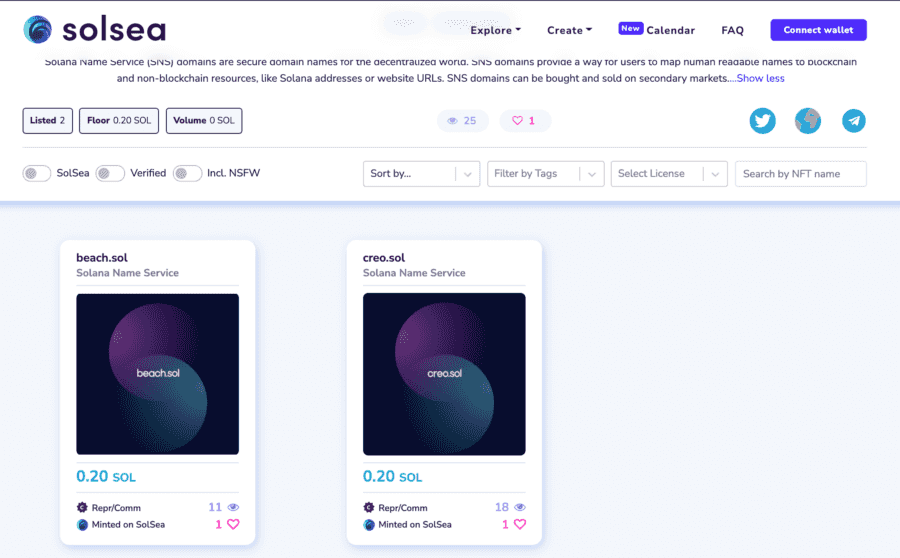
Going Global
It’s worth remembering that the issue of adoption is a key underlying factor in the blockchain domain space. Anything that can simplify the process of using cryptocurrencies on a daily basis is a welcome incentive for more people to wade into the crypto waters.
Similarly, those looking to build out the Web 3.0 that blockchain is making possible need all the help they can get to simplify their processes and maintain their autonomy. ENS and Unstoppable Domains, as well as newer players like UniLogin all understand the potential scope of blockchain domains and their place in this ever-expanding ecosystem.
Perhaps it is possible to imagine a future where everyone uses their blockchain domain name like a ubiquitous single log-in for browsing websites that require sign-ins and the same or a different one for sending and receiving payment, as hinted at by Matthew Gould in a podcast. In the words of Brantley Millegan, ‘our clientele is the entire world.’
Disclaimer: These are the writer’s opinions and should not be considered investment advice. Readers should do their own research.


